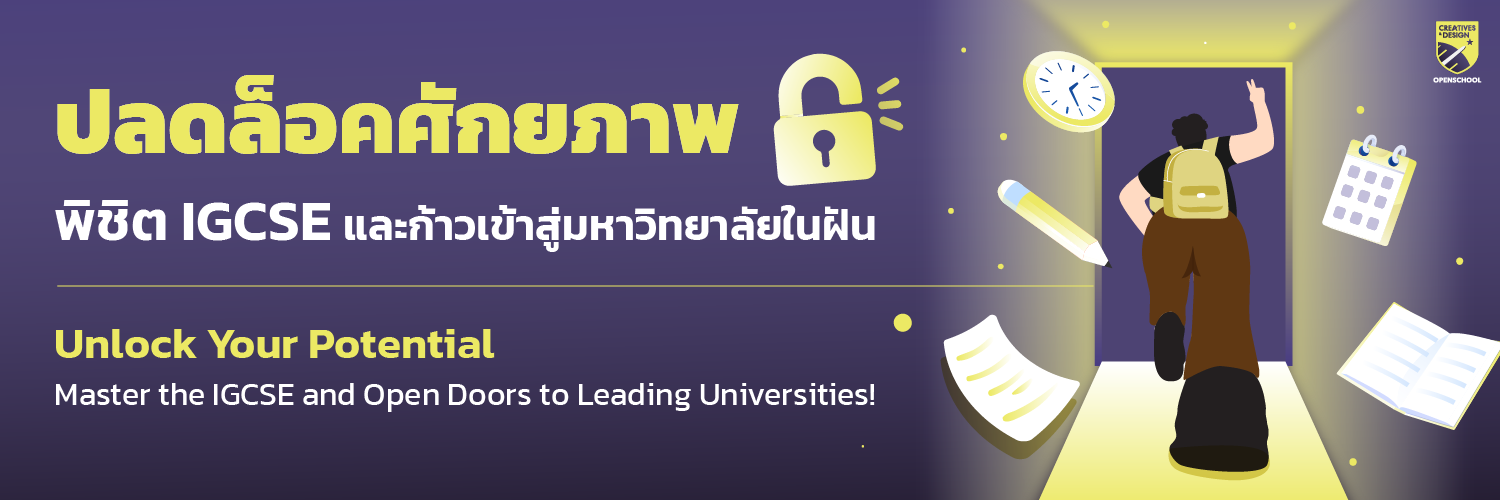
การเตรียมตัวสอบ IGCSE วางแผนอย่างไรให้พร้อมสำหรับมหาวิทยาลัยชั้นนำ
ในบทความนี้จะกล่าวถึงเรื่องของการสอบและการเตรียมตัวเพื่อความสำเร็จที่ไม่ได้อยู่แค่ในรั้วโรงเรียน แต่ยังเป็นการวางรากฐานสำคัญให้กับน้องๆ นักเรียนในการก้าวเข้าสู่มหาวิทยาลัยชั้นนำทั้งในประเทศ และต่างประเทศ
การสอบ IGCSE Pearson Edexcel
แม้ว่า Newton จะเป็นศูนย์สอบของ Pearson Edexcel แต่จะไม่มีการบังคับให้นักเรียนทุกคนสอบ การสอบทั้งหมดจะขึ้นอยู่กับความสมัครใจของนักเรียนแต่ละคน นักเรียนสามารถเริ่มสอบได้ตั้งแต่ Year 10 หรือตอนอายุประมาณ 14-15 ปี ทั้งนี้ขึ้นอยู่กับความพร้อมของตัวนักเรียนเอง และข้อกำหนดของแต่ละมหาวิทยาลัย โดยปกติแล้วนักเรียนจะต้องสอบหลายวิชา เพื่อสร้างพื้นฐานที่แข็งแกร่งสำหรับการเรียนต่อในระดับที่สูงขึ้น เช่น A-Level
สำหรับนักเรียนที่ตั้งใจอยากจะเข้าเรียนในมหาวิทยาลัยชั้นนำ การสอบ IGCSE ควรจะประกอบไปด้วยวิชาหลัก ๆ อย่างน้อย 5-7 วิชา ซึ่งควรครอบคลุมทั้งด้านวิทยาศาสตร์ คณิตศาสตร์ ภาษา และวิชาสังคมศาสตร์ ตัวอย่างของวิชาที่ควรสอบ ได้แก่ :
- Mathematics (Higher หรือ Further)
- English Language (English Language A หรือ English as a Second Language)
- Sciences (เช่น Physics, Chemistry, Biology)
- Humanities (เช่น Psychology, History)
การเตรียมตัวสอบ IGCSE ไม่ควรจะเกิดขึ้นแค่ในห้องเรียนเท่านั้น การทบทวนอ่านเพิ่มเติม การฝึกทำแบบฝึกหัด และการฝึกทำ Past Papers ที่บ้าน ก็เป็นส่วนสำคัญในการพัฒนาความเข้าใจในเนื้อหา ช่วยให้คุ้นเคยกับรูปแบบของคำถามและช่วยพัฒนาทักษะการจัดการเวลาเมื่อต้องทำข้อสอบจริง โดยทั่วไปแล้ว นักเรียนควรจัดสรรเวลาในการทำสิ่งเหล่านี้นอกเวลาเรียนประมาณ 5-10 ชั่วโมงต่อสัปดาห์และต่อวิชาที่เลือก
Past Papers และการใช้เวลาในการเตรียมตัว
Past Papers ถือเป็นเครื่องมือที่สำคัญ สำหรับการเตรียมตัวสอบ IGCSE นักเรียนควรเริ่มทำ Past Papers อย่างจริงจังอย่างน้อย 3-6 เดือนก่อนสอบ ซึ่งไม่เพียงแต่จะช่วยพัฒนาทักษะการจัดการเวลาในระหว่างสอบจริง แต่ยังช่วยระบุจุดในเนื้อหาที่ต้องปรับปรุงเพิ่มเติม
ควรวางแผนและการจัดการเวลาอย่างมีประสิทธิภาพเป็นสิ่งจำเป็น รวมถึงการพักผ่อนและการทำกิจกรรมเสริมต่าง ๆ เช่น การออกกำลังกาย การทำสมาธิ หรือการฟังเพลง เพื่อช่วยลดความเครียดและเพิ่มสมาธิในการเรียน หากมีเนื้อหาบางส่วนที่ยังไม่เข้าใจ การขอความช่วยเหลือจากครูหรือผู้สอนก็เป็นอีกหนึ่งวิธีที่จะช่วยเสริมความเข้าใจได้ นอกจากนี้ยังมีแหล่งข้อมูลที่สามาถศึกษาได้บนออนไลน์ เช่น วิดีโอสอนเนื้อหาตามหัวข้อต่าง ๆ และบทความที่ช่วยในการเรียนรู้เพิ่มเติมได้
นอกจากนี้ การตั้งเป้าหมายเล็ก ๆ และค่อย ๆ ทำให้สำเร็จจะช่วยสร้างความมั่นใจและพัฒนาตนเอง อย่ากลัวที่จะล้มเหลว เพราะทุกความพยายามคือก้าวสำคัญ ขอให้เชื่อมั่นในตัวเองและเดินหน้าต่อไป🌟

Preparing for the IGCSE Exam : How to Plan for Success at Leading Universities
This article covers the essential strategies for exam preparation, not just for success in school, but as a crucial foundation for gaining entry to top universities, both domestically and internationally.
IGCSE Pearson Edexcel Exams
Although Newton is a Pearson Edexcel examination centre, taking the exams is not mandatory for all students. It is entirely voluntary. Students can start taking their exams from Year 10, around the ages of 14-15, depending on their readiness and the specific requirements of universities they aim to apply to. Typically, students sit multiple subjects to build a strong foundation for higher-level study, such as A-Levels.
For students aspiring to enter prestigious universities, taking 5-7 core IGCSE subjects is recommended, covering a range of fields such as science, mathematics, languages, and social sciences. Key subjects to consider include :
- Mathematics (Higher or Further)
- English Language (English Language A or English as a Second Language)
- Sciences (e.g., Physics, Chemistry, Biology)
- Humanities (e.g., Psychology, History)
Succeeding in the IGCSE requires more than classroom learning. Self-study, completing exercises, homework, and working through past papers at home are crucial for improving content understanding, becoming familiar with question formats, and practising time management for the real exams. On average, students should allocate 5-10 hours per week per subject for this additional study outside of class time.
Past Papers and Time Management for Exam Preparation
Using past papers is key to IGCSE exam prep. Start 3-6 months in advance to improve time management and spot areas needing more focus. Plan well and balance study with relaxation activities like exercise or music to reduce stress and stay focused while studying. If anything is unclear, it’s a good idea to ask supervisors for help. There are also many online resources, like video lessons and articles, that can be helpful for extra study.
Additionally, setting small goals and achieving them step by step can build confidence and help you grow. Don’t be afraid of failure, as every effort is an important step forward. Believe in yourself and keep moving ahead.🌟
เขียนโดย: P’Earth Executive Director of Operations and Deputy Director, The Newton Sixth Form and The Essence
เรียบเรียงโดย: Nerin Nilket Integrated Marketing Communication Officer


